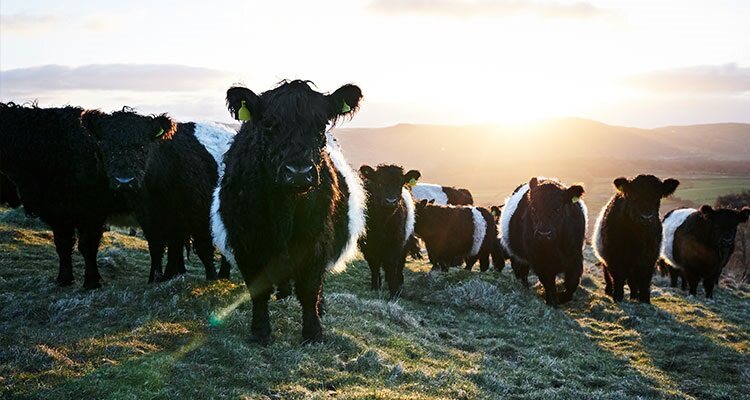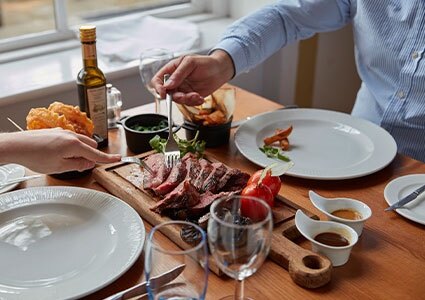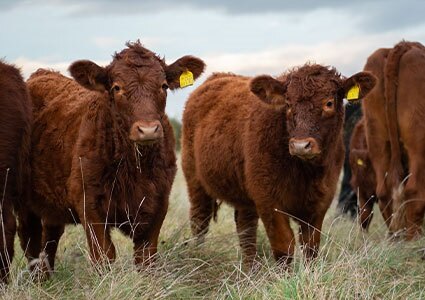
Explore Buitelaar Group’s responsible approach to regenerative farming
With over a century of experience under its belt, Buitelaar Group (Buitelaar) is a family-owned business specializing in sustainable, higher welfare beef, with a specific emphasis on British beef and British rosé veal. The business, as it stands today, was built from the ground up by CEO, Adam Buitelaar, who is particularly passionate about fostering a more sustainable future for the coming generations of family farmers. This drive has seen Buitelaar become a highly influential voice in the meat industry, advocating for knowledge transfer across the agricultural industry. Adam provides a brief account of Buitelaar’s journey.
“ Buitelaar was originally founded in 1922, making me the fifth generation of the family to be involved in the business. We celebrated our 100th anniversary two years ago, so it is safe to say that we have witnessed a lot of milestones during our time in business. One of our notable achievements was accomplished by my father when he was awarded the Queen’s Award to Industry back in the 1970s. Yet, what I am most proud of is the transformative impact we’ve had on farming. As a fully integrated beef and livestock business, we cover everything from livestock genetics to retailing high-quality meat. But where we make the greatest difference is in our regenerative farming practices as we strive to ensure that everybody has a safe future. I believe the regenerative aspect of our work is equally as important as producing good food, because it’s all about safeguarding human health and preserving the planet. Thus, I think our work within regenerative farming is our biggest milestone to date,” he states.
Buitelaar was originally founded in 1922, making me the fifth generation of the family to be involved in the business. We celebrated our 100th anniversary two years ago, so it is safe to say that we have witnessed a lot of milestones during our time in business. One of our notable achievements was accomplished by my father when he was awarded the Queen’s Award to Industry back in the 1970s. Yet, what I am most proud of is the transformative impact we’ve had on farming. As a fully integrated beef and livestock business, we cover everything from livestock genetics to retailing high-quality meat. But where we make the greatest difference is in our regenerative farming practices as we strive to ensure that everybody has a safe future. I believe the regenerative aspect of our work is equally as important as producing good food, because it’s all about safeguarding human health and preserving the planet. Thus, I think our work within regenerative farming is our biggest milestone to date,” he states.
Providing a superior product
Renowned for its sustainable and higher welfare supply chain, Buitelaar has implemented a range of systems ensuring sustainability throughout its operations. “It all starts with working with our farmers to select the right genetics. We aim to breed animals that grow strong and healthy without needing to consume too much food. However, it’s important to note that we never compromise on taste and quality. At the end of the day, our mission is to provide a superior product to our customers because if we got so engulfed by the environmental aspect of the business that we neglected the quality of our meat, nobody would buy, which would undermine our efforts to transform the industry.
Once the cattle are placed at farms, our technical team visits each site to ensure that the animals are thriving, that the farmer is adhering to positive environmental practices, and crucially, that they can earn a good living out of them. This process is ongoing; when the livestock are young, they require extra care and then once older, the team’s focus shifts to providing advice on pastures, multispecies swards, and various other beneficial regenerative practices,” Adam informs.
Limiting food waste
 While farming and meat sales are at the core of Buitelaar’s operations, the company also diversifies into other endeavors that contribute to fostering a better environment. “Everything we do revolves around our animals. As we strive to deliver an outstanding, sustainably produced product, we also specialize in the field of meat science. This expertise ensures that when the animal arrives at the meat factory, it is very relaxed, thus minimizing its production of lactic acid, which can be detrimental to both animal well-being and the end-product. Moreover, our cold chain site and dry ageing units are closely monitored to guarantee all processes run smoothly. In another of our divisions, we focus on using the hides and skins –byproducts of our meat business – for the production of high-quality leather. This division primarily serves the Italian, Spanish, and Chinese markets. Another division is dedicated to pet food. Just as for the hide and skin business, Buitelaar’s aim with this division is to maximize the utilization of meat byproducts. Therefore, we use the trimmings and carcasses left after the meat production process to make pet food. These two separate divisions showcase our commitment to limiting food waste and our environmental impact as we use every part of our animal within the food chain,” he enlightens.
While farming and meat sales are at the core of Buitelaar’s operations, the company also diversifies into other endeavors that contribute to fostering a better environment. “Everything we do revolves around our animals. As we strive to deliver an outstanding, sustainably produced product, we also specialize in the field of meat science. This expertise ensures that when the animal arrives at the meat factory, it is very relaxed, thus minimizing its production of lactic acid, which can be detrimental to both animal well-being and the end-product. Moreover, our cold chain site and dry ageing units are closely monitored to guarantee all processes run smoothly. In another of our divisions, we focus on using the hides and skins –byproducts of our meat business – for the production of high-quality leather. This division primarily serves the Italian, Spanish, and Chinese markets. Another division is dedicated to pet food. Just as for the hide and skin business, Buitelaar’s aim with this division is to maximize the utilization of meat byproducts. Therefore, we use the trimmings and carcasses left after the meat production process to make pet food. These two separate divisions showcase our commitment to limiting food waste and our environmental impact as we use every part of our animal within the food chain,” he enlightens.
Showcasing best practice
Adam goes on to share that Buitelaar has repurposed an old estate for regenerative farming. “Prumpelstown Estate, originally owned by the Duke of Leinster, was once an old hunting lodge. It boasts parkland in the front and massive courtyards at the back. We have developed a regenerative farm within the estate, all while leaving the paddocks, trees, and parkland in their original state. Now, the farm serves as a demonstration site welcoming farmers to visit and understand what’s possible. Eventually, the idea behind Prumpelstown Estate is to host meat festivals and explore different cooking techniques. To that end, we plan to install dry-aged meat units within the courtyards and established development kitchens. Furthermore, we have apartments within the estate that are reserved for chefs. This way, they can cook and learn from us but also enjoy the farm experience for a few days,” he concludes.
Adam’s dedication to sustainable innovation and eagerness to spread knowledge about regenerative practices puts Buitelaar in a strong position to revolutionize the meat industry for the better.